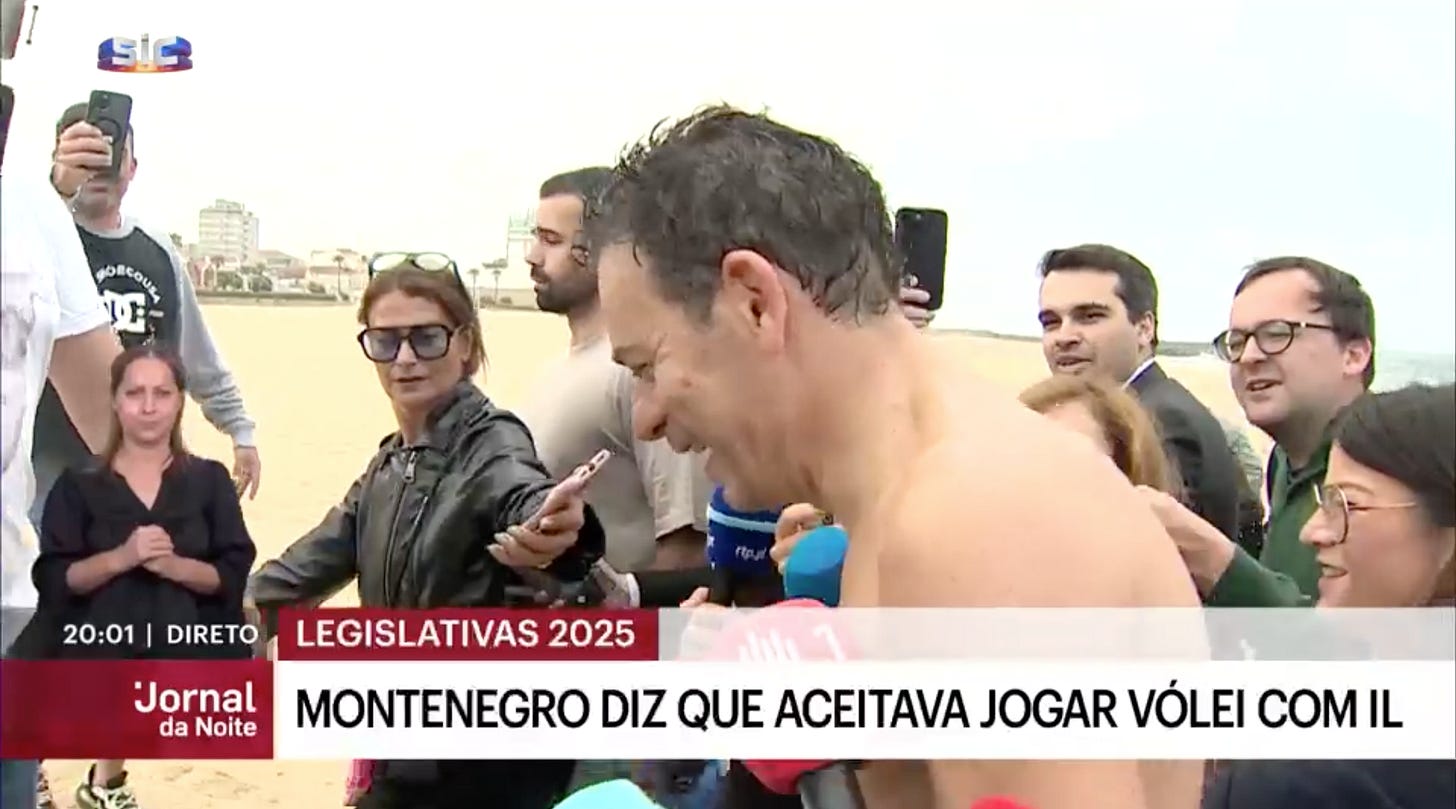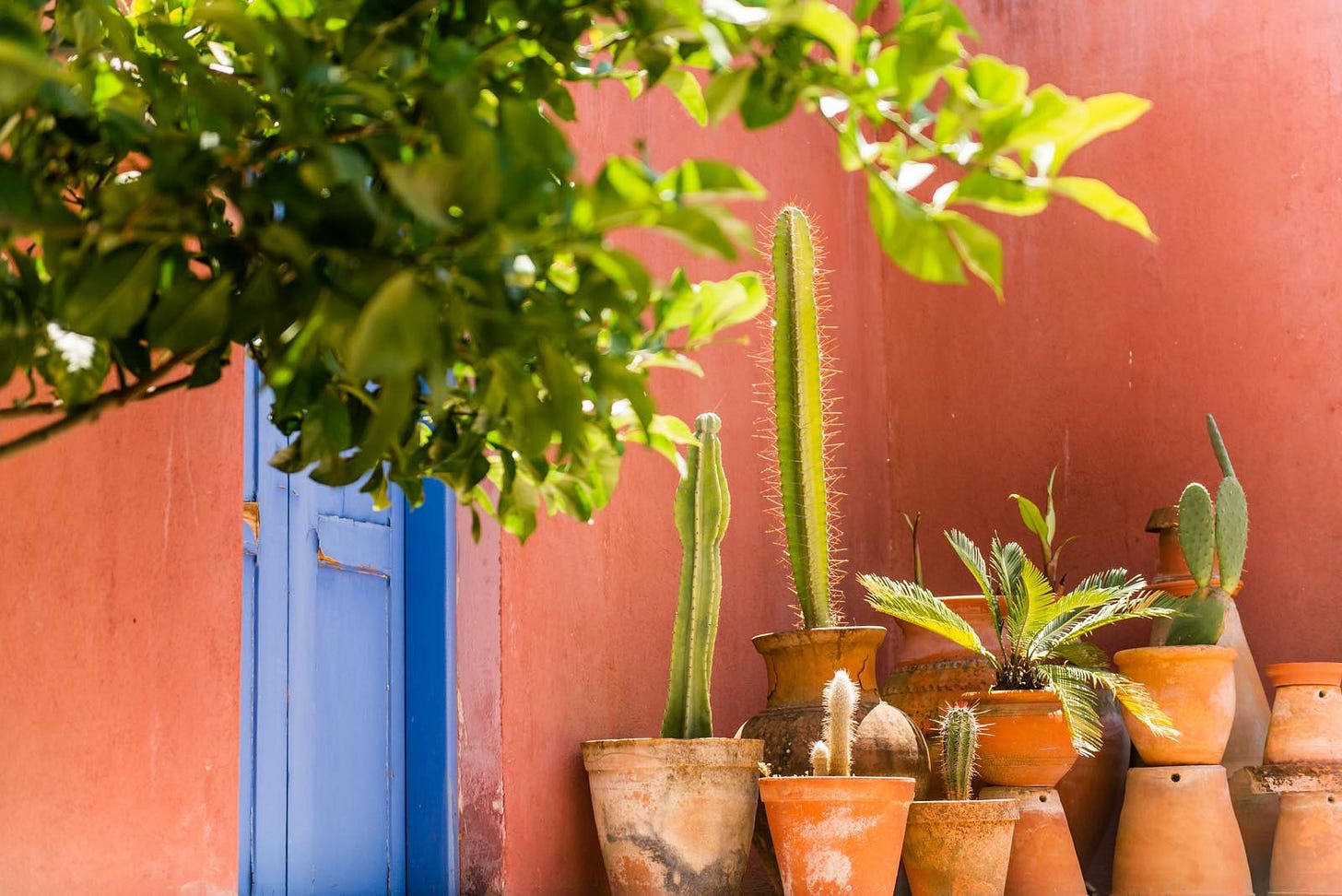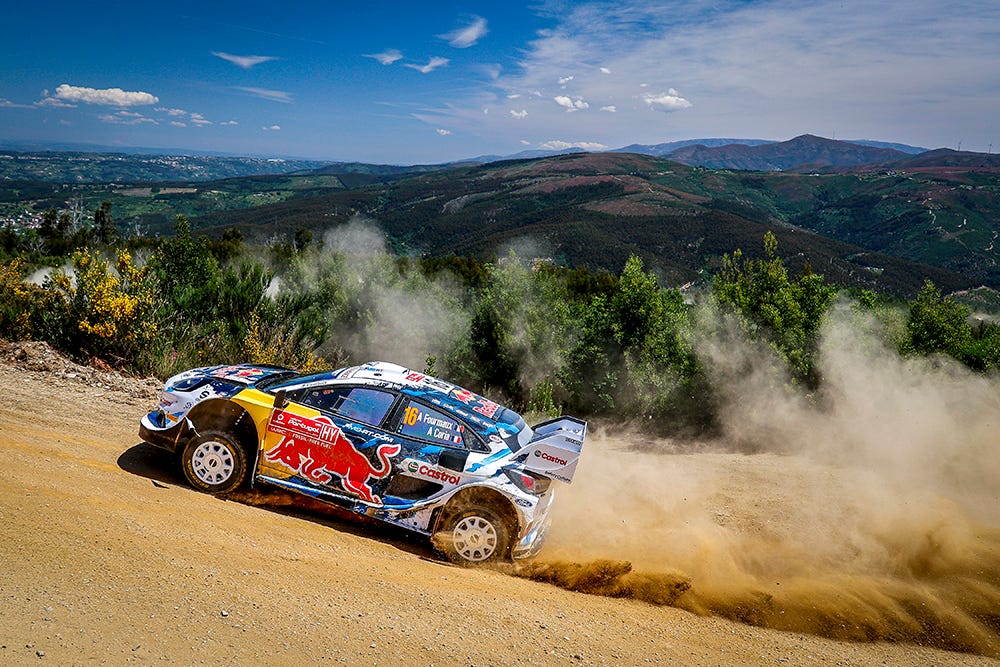Friday Briefing: How to watch Portugal's election like a pro
Good morning and welcome to PORTUGAL DECODED. Polls suggest that the AD is likely to win again on Sunday, but an upset can't be ruled out. Here's your step-by-step guide to election night and after.
TALK OF THE TOWN

If you enjoy reading PORTUGAL DECODED, please consider donating to keep it free and independent – your generosity means everything!
POLITICS
Chega leader André Ventura will miss the final two days of the campaign after being hospitalized following a second health scare. Now discharged, he said tests ruled out heart issues and confirmed an acute esophageal spasm (More).
Presidential frontrunner Henrique Gouveia e Melo confirmed his candidacy just four days before the snap legislative elections, prompting criticism from major political parties over the timing of his announcement (More).
SOCIETY
Portugal has approved public funding for its first hospital-use psychedelic drug for severe depression, alongside new clinical guidelines urging strict regulation, medical supervision, and ethical standards for future psychedelic therapies (More).
Infant mortality in Portugal rose 20% in 2024, with 252 deaths, the highest since 2019. The spike sparked political tension, with the opposition blaming the government for underfunding maternal care services (More).
ECONOMICS
Portuguese families saw the highest real income growth in the OECD in 2024, rising 6.7% due to higher wages and lower taxes, outpacing Spain and Hungary amid slowing inflation across most member countries (More).
REN, Portugal’s national electricity grid operator, had explicitly warned of the risk of a blackout in December 2024, but the state failed to act, delaying essential investments that could have prevented the blackout (More).
CULTURE AND SPORTS
Portugal marks a strong presence at the 78th Cannes Film Festival, which began this week, with five films selected, including two feature films and three shorts, two of them competing for the prestigious Palme d’Or (More).
The Madeiran band NAPA qualified for the Eurovision 2025 Grand Final with their song “Deslocado,” overcoming low odds. The final will take place on Saturday, and will be broadcast live on RTP1 in Portugal (More).
If you enjoy reading PORTUGAL DECODED, please consider donating to keep it free and independent – your generosity means everything!
DECODER
Step 1: Look for the election winner
In the last election, the difference between the AD (the coalition of the centre-right PSD and the conservative PP) and the Socialists was less than 1% (just 54,000 votes) yet that narrow margin was enough for the AD to form a government. Most polls suggest the AD is on track to win Sunday’s election again, but that outcome is far from certain. When the first projections are released at 8:00 p.m. on the news channels, three key factors could still lead to an upset. First, most opinion polls (including the one shown in the infographic above) had response rates between 20% and 30%, raising questions about how representative they are of the broader electorate; second, voter turnout is unlikely to match that of the 2024 legislative elections, which saw participation rise to 59.84%, the highest since 1995. Third, polling data shows that respondents have a broadly negative view of the current government, with two-thirds saying it’s time for a change. These could still throw a wrench into predictions.

Step 2: Break down the numbers into seats
While the question of who wins is important, the more crucial issue this time is: who can govern? On this point, the Portuguese Constitution is clear but flexible: “The Prime Minister is appointed by the President of the Republic, after hearing the parties represented in the Assembly of the Republic and taking into account the election results” (Article 187). In other words, the President is not obliged to appoint the leader of the winning party as Prime Minister. This time, President Marcelo Rebelo de Sousa has already made it clear that he will only swear in a government with credible assurances that it can command a stable majority in Parliament - at least until the end of his presidential term in early 2026. There is precedent for this: in 2015, although the centre-right PSD led by Prime Minister Pedro Passos Coelho won the most seats, it failed to secure a governing majority. The left-wing parties, under Socialist leader António Costa, joined forces to form a slim majority and ultimately a government. So, on Sunday night, all eyes will be on the seat count because the real question is not just who wins, but who can lead a stable majority in Parliament.

Step 3: Keep an eye on Chega’s showing
At first glance, there appear to be two main coalition paths: the AD and the Liberal Initiative (IL), which polls suggest are closer to securing a majority; or the Socialists (PS) allied with other left-wing parties such as the PCP, Livre, and the BE. But other scenarios remain possible. The Greens (PAN) could help either the right or the left to reach a majority. The Madeira-based centrist party JPP might also enter Parliament and play a role in forming a coalition. And despite repeated denials from Prime Minister Luís Montenegro, there is still speculation that the AD could strike a post-election deal with Chega. Even if this doesn’t happen, much will still hinge on Chega’s result (which seems highly unpredictable now given the unprecedented situation of André Ventura’s health scares). A weak performance by Chega would likely suggest that its voters either stayed home or shifted their support to the AD. In either case, this could put the AD in a position to form a majority. Conversely, a strong showing by Chega would likely mean the AD has fallen short of a majority, and may even have come second to the Socialists (PS).

Step 4: Listen for signs of compromise (or hostility!)
It’s complicated. If neither the AD nor the PS secures a parliamentary majority, any government formed is likely to face a motion of censure on its programme. That’s exactly what happened last year, when the Communists (PCP) and the Left Bloc (BE) opposed the AD’s program, and the PS abstained - allowing Luís Montenegro to take office. Without a working majority, the AD and PS will also need each other’s support, or at least abstention, to make any government viable. So far, both parties have sent mixed signals, with some leading figures warning they won’t allow the opposition to govern. Given the President’s firm stance that he won’t swear in a government without parliamentary viability, the pressure is on both sides to reach some form of understanding before any program is presented to Parliament - or risk not getting that far at all. Therefore, much of the focus on election night will be on party leaders’ statements and whether they signal openness to cooperation.
Step 5: Stay put (it might take a while before Portugal has a new government)
Though an agreement may seem unlikely now, we remain hopeful that, in the end, common sense will prevail and parties will find a way out of the crisis. As the one who appoints the Prime Minister and invites them to form a government, the President will play a pivotal role. On Wednesday, President Marcelo said he would seek “the best or least bad governance solution” - this might take some time. He also stressed over the weekend that fresh elections cannot be called within six months of a legislative vote, nor during the final six months of the presidential term. This means that new general elections could only be held in late spring or early summer of next year. Until then, the current government could remain in a caretaker role, or the President might persuade Parliament to back an alternative government to serve until elections are possible. So, keep an ear on the President after the election for his remarks could hint at more than they appear to on the surface.
TIPS OF THE WEEK
Lisbon
Open Gardens 2025
Now in its 14th edition, this much-deserved celebration of the city’s green spaces returns over the next two weekends: May 17–18, and 24–25. Across Lisbon, garden gates will open free of charge, welcoming the public to enjoy guided tours, workshops, nature walks, and hands-on gardening activities. Festival highlights include newer gems like the MACAM Garden, Jardins do Bombarda, and Jardim do Caracol da Penha. You can also take part in BioBlitzes, fun citizen science events where participants help identify and record local biodiversity. Organised in partnership with Lisbon City Council, the festival is a celebration of the vital connection between people and nature, inviting all to imagine, experience, and help grow a more sustainable and inclusive future. Full programme available here.
Porto
Tinariwen
The iconic Malian collective Tinariwen returns to Portugal for a performance on May 25 at Casa da Música (and May 26 in Lisbon), following the release of their latest album “Idrache (Traces of the Past)” — a compilation of some of the band’s greatest hits from recent years. Draped in flowing desert robes and Tuareg turbans (or cheches), Tinariwen are the pioneers of what became known as “desert blues”, a genre they themselves call “assuf” — a Tamasheq word meaning both “nostalgia” and “longing for home.” Formerly armed rebels in the Tuareg uprising of 1990, they famously traded Kalashnikovs for guitars, channelling their fight into music. With their hypnotic grooves, snarling vocals, airy guitar lines, and handclap rhythms, they’ve carved out a space as true rock 'n’ roll rebels with a cause. Tickets here.
North and central Portugal
WRC Vodafone Portugal Rally 2025
The 2025 Vodafone Rally de Portugal kicked off Thursday and will run through May 18, finishing with iconic stages in Paredes, Felgueiras, and Fafe. Organized by the Automóvel Club de Portugal, the rally boasts the strongest line-up of the WRC season, with 12 Rally1 cars. Spanning 344.5 km over 24 timed stages, the route includes two new sections linking Águeda, Sever do Vouga, and Albergaria. Portugal is the fifth round of a 14-event championship, after Monte Carlo, Sweden, Kenya, and the Canary Islands. Toyota has won all four rallies so far and fields four GR Yaris Rally1s in Portugal. Elfyn Evans leads the standings with 109 points. A major national security operation will involve around 2,800 GNR officers as the rally moves through the country’s North and Central regions. More information here.
Throughout the country
International Museum Day
International Museum Day (IMD) is celebrated on May 18, and this year, it will be preceded by European Museum Night on May 17. Across the country, museums will offer a wide range of free activities, including guided and self-guided tours, workshops, music, and special events. Here are a few standout highlights: MAAT (Lisbon): On Sunday, from 11 a.m. to 12 p.m., there will be an open-air Chi Kung class. The Hat Museum (Museu da Chapelaria), São João da Madeira: On Saturday and Sunday, visitors can watch live demonstrations of traditional hat-making techniques. On Saturday, the Soares dos Reis Museum in Porto will remain open until 11 p.m., offering a rare chance to join the special guided tour "Twilight" at 8 p.m that explores the theme of dusk and dawn through selected works. A night-time guided tour will take visitors through the historic Monastery of Alcobaça, offering insight into the daily lives of the Cistercian monks who lived there for nearly 700 years, with access to some of the monastery’s lesser-known spaces. More events and information here.








Great analysis. My money would be on the IL dropping support and becoming a nonviable party, while the PS continues to bleed seats to Chega across not only the Algarve, but also the Alentejo. Working-class people are switching to the populist right across Europe, and this will only accelerate more since the last elections.